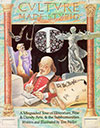I’ve been reading Beowulf in the original, and as you can imagine, having a wee bit of trouble with the language. Still, the stirring descriptions of combat and the thunderous roll of the alliterative metre fully justify the poem’s reputation as the fountainhead of English literature:
Meanehwæl, baccat meaddehæle, monstær lurccen;
Fulle few too many drincce, hie luccen for fyht.
Ðen Hreorfneorhtðhwr, son of Hrwærowþheororthwl,
Æsccen æwful jeork to steop outsyd.
Þhud! Bashe! Crasch! Beoom! Ðe bigge gye
Eallum his bon brak, byt his nose offe;
Wicced Godsylla wæld on his asse.
Monstær moppe fleor wyþ eallum men in hælle.
Beowulf in bacceroome fonecall bamaccen wæs;
Hearen sond of ruccus sæd, “Hwæt ðe helle?”
Graben sheold strang ond swich-blæd scharp
Stond feorth to fyht ðe grimlic foe.
“Me,” Godsylla sæd, “mac ðe minsemete.”
Heoro cwyc geten heold wiþ fæmed half-nelson
Ond flyng him lic frisbe bac to fen
Beowulf belly up to meaddehæle bar,
Sæd, “Ne foe beaten mie færsom cung-fu.”
Eorderen cocca-cohla yce-coeld, ðe reol þyng.—Tom Weller, Cvltvre Made Stvpid
But somehow methinks Tom Weller, þætte rihte ealde Englisce scop, could have spun out England’s national epic to more than eighteen lines. Still, not bad for a culture that only emerged from the barbarous night of the Dark Ages in 1987, when Þacere ruled in Heorot.
Both Cvltvre Made Stvpid and its companion volume, Science Made Stupid, are unfortunately out of print, but they are now available as free downloads — with the author’s permission! Find them both here:
http://www.chrispennello.com/tweller/








Recent Comments